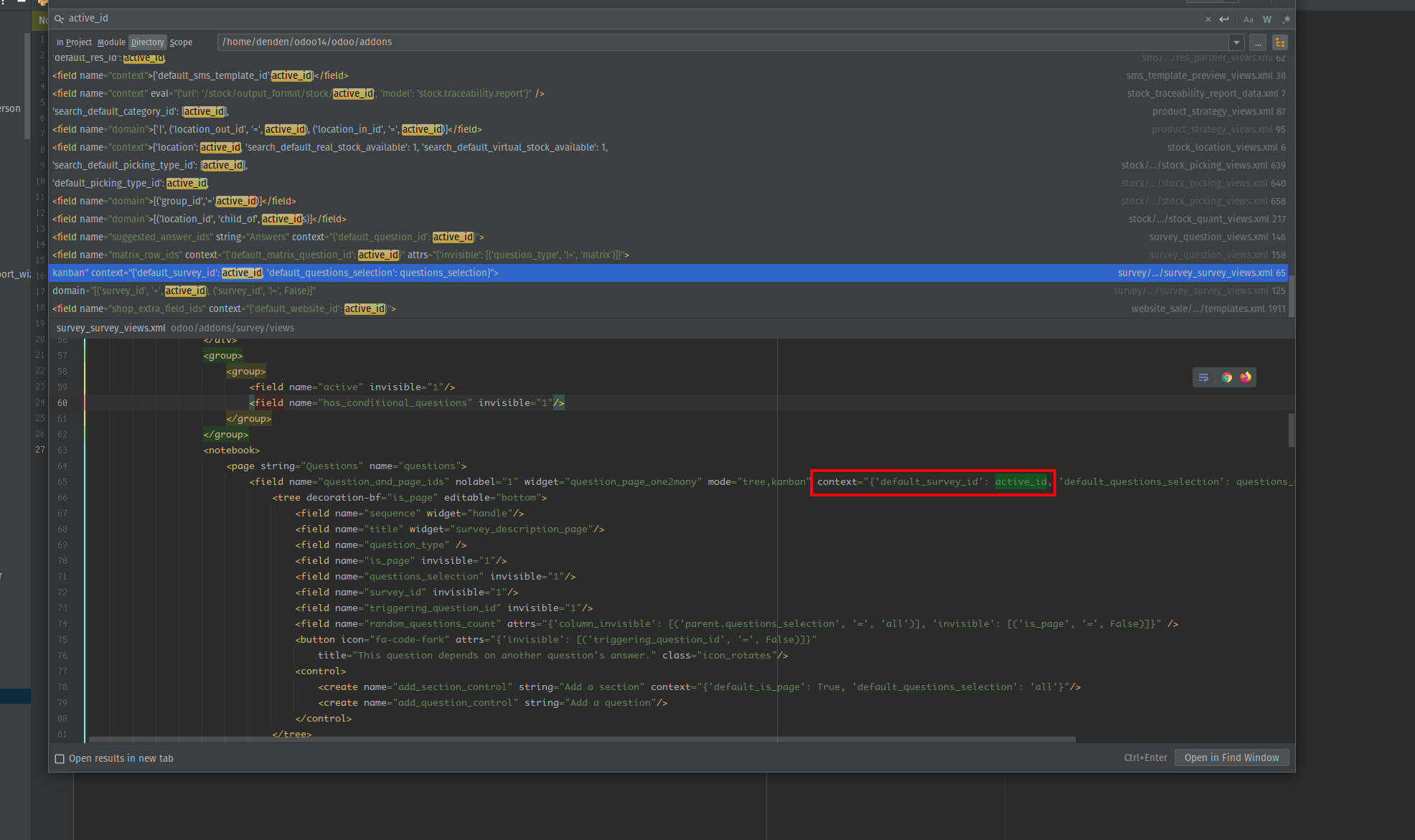New issue
Have a question about this project? Sign up for a free GitHub account to open an issue and contact its maintainers and the community.
By clicking “Sign up for GitHub”, you agree to our terms of service and privacy statement. We’ll occasionally send you account related emails.
Already on GitHub? Sign in to your account
Odoo 15 - Context not being passed to Many2one field #82366
Comments
|
Why are you even passing it or showing it in the one2many form view? One2many will automatically get the id of the account. It makes no sense to default it because if you changed it you couldn't save it. There are hundreds of working examples in the code. When you save it vals will be something like {'projects': [(0, 0, {'budget': 10}]} and written on account. |
|
@gdgellatly thanks for your reply. I simply want to display it there for a user experience perspective, so that it's always very obvious what info is being input. Preferably, I wouldn't want to omit any information from the form views. Alternatively I could also have two form views: one for when the Project is created individually (from the "root"), and another one from when the project is created through an Account, but that will led to a bit of code bloat if I do it for every single pair of related models in my application. This is the main reason why I want to show my Many2one fields - homogeneity. Thanks. |
|
It doesn't work even if you catch the variable from context in a default_get method it won't set it. I think the old way is the proper way. |
|
I had to use this dirty hack: |
Yes, you are correct that it will automatically get the id, but it only gets it after the record is saved. The problem with that is that I want things domained off the value of the parent record (record it is getting created from), and since the default value does not get set till the record is saved, it does not domain the other field(s). I am also having this issue in V14, we recently migrated to 14 from V12 and it worked as expected (outlined above) in V12. |
|
Isn't that what |
So I am only coming from mostly having worked in v12 so maybe it has changed since v12, but in v12
What's strange is I can pass the default values for any other many2one fields on the child from, but not the parent many2one (even the @Yenthe666 do you have any input on whether this is a bug or if there is a new way since v12 to pass default parent many2one value to a child view? |
|
Yes, I've faced similar problems. In fact have one on a project at the moment, where really my only out has been to pass the parent id via a button on an editable tree view to pop the form. But the UX is clunky as. I've tried flushes all sorts before popping to try and make clean. I'm almost at point where actually I'm just going to hide the fields until the record is saved. But I seem to recall in product.supplierinfo it does handle the case of the same form being popped from both templates and products. |
|
Hello, Is there any way to get this bug more exposure? It is causing major headaches with our modules that use to work on V12 and now don't work anymore. It's hard to believe that more people are not affected by this issue. Edit: |
|
This seems to be related: |
|
Make an official ticket through odoo.com/help honestly. Odoo does not care about publicly reported issues.. |
Thanks @Yenthe666 for the response. I did officially make a ticket on 11/11/22 ticket #3064991. I will see what they say. |
|
Hi, This is not a bug - It is indeed not possible to pass default values for relational objects that way; you'll need to use specific context override (not prefixed by default) and handle them manually at the correct places if you want this behaviour. To bypass this, you can simply use a context key of your choosing (e.g. |
|
Thanks so much for your reply @bouvyd . However that does not completely make sense, please see this attached example on the runbot of v14. You can see that in an embedded tree view, the product variants are domain-ed correctly off the current product template. As soon as I simply remove the tree_view_ref so that it shows a pop up form instead (which is what the examples above were using), the domain stops working for the product variants. Can you explain to me why the tree view works, but not the form view? You say this has been the case since before even v11, but it has worked in v12 for me in 2 separate companies (one running community version and the other enterprise). And in both companies, we used the default_ in many places throughout our codebases. I greatly appreciate your time! (you can also see the Odoo ticket mentioned above #3064991 for more details) ctx_error.mp4 |

Impacted versions: 15
Steps to reproduce:
context="{'default_budget': 10, 'default_account': active_id}"as such:Current behavior:
Context is only passed to the budget field:

even though the context dictionary is set:

Expected behavior:
The account field should be pre-filled with the right account.
Video/Screenshot link (optional):
Support ticket number submitted via odoo.com/help (optional):
The text was updated successfully, but these errors were encountered: